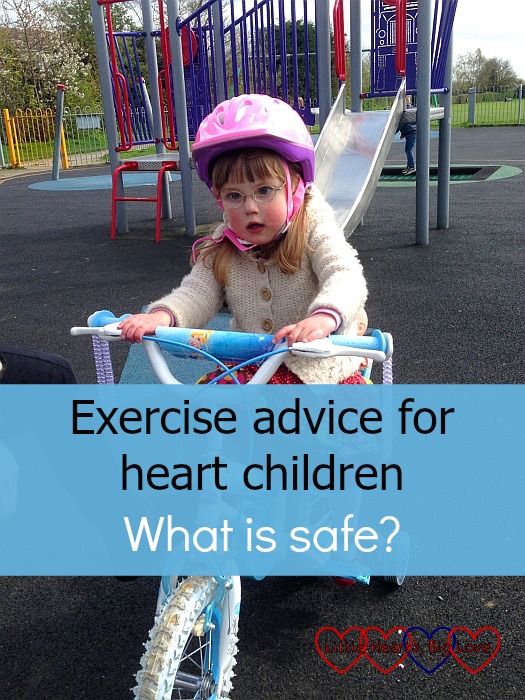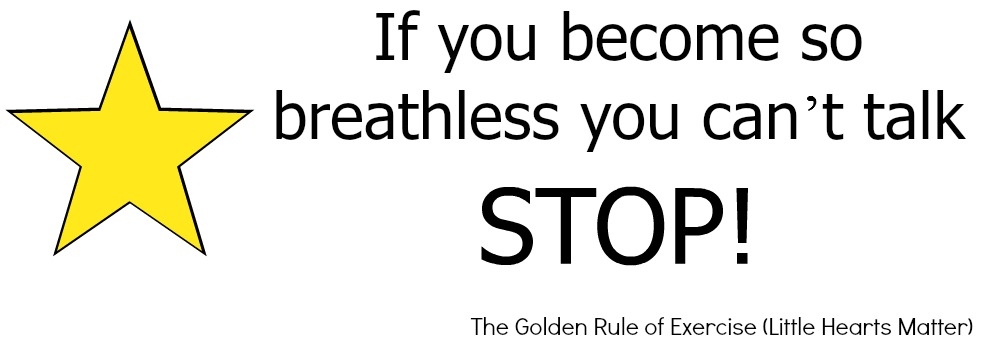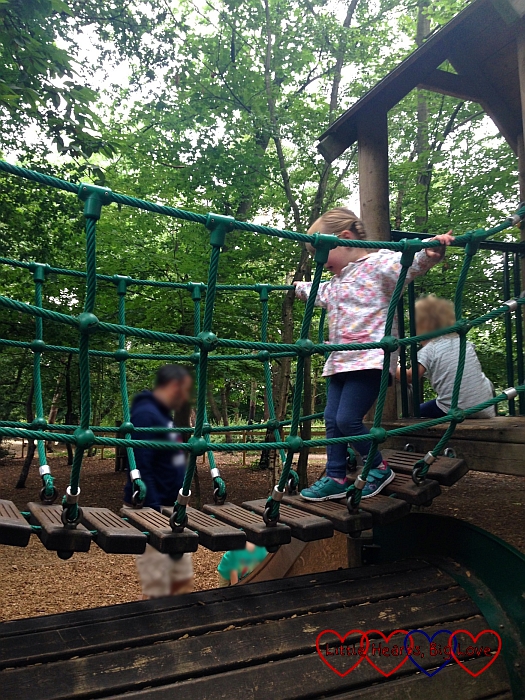One of my day-to-day worries as a heart parent is trying to work out just how much exercise is safe for my heart child. I know that it is important for her to get a good amount of exercise, but I worry about her overexerting herself and potentially putting strain on her heart. We have been told that she will self-limit but sometimes it is hard not to step in and restrict her if I think she is getting tired. I was recently invited to give feedback on some booklets which are being produced by Heart Research UK as part of their physical activity toolkit which they are hoping to launch next spring. They will be a great resource for helping answer some of the questions that heart children and their parents may have regarding exercise and have helped reinforce some of the information I have previously read from other resources.
The benefits of regular exercise
Regular exercise helps us to maintain a healthy weight, improve fitness levels and increase exercise capacity levels, and reduces the risk of developing cardiovascular disease. Recommendations published in the European Journal of Preventive Cardiology advise that children with congenital heart defects should have “60 minutes or more of moderate-to-vigorous physical activity” each day.
How much is too much?
Although the general recommendation is that children with CHDs participate in 60 minutes of physical activity per day, this does not need to be in one session. It is important for heart children not to push themselves too far and put extra strain on their heart. Little Hearts Matter state that the golden rule for knowing how much is too much is this:
What activities are suitable for heart children?
Which types of exercise are suitable depends on your child’s specific heart condition and medical needs. Dynamic activities – those that use lots of muscle groups with plenty of movement – e.g. jogging, swimming or tennis, are best for improving cardiovascular fitness whereas static activities, such as weight lifting, which use muscles but involve very little movement, are less advisable. It is important to discuss which activities are suitable for your heart child with your cardiologist as some activities may be fine for some heart children but not for others.
Competitive sports
Whilst taking part in certain sports recreationally may be fine, heart children may be advised not to take part competitively. This is because children may tempted to push themselves too far due to wanting to win or do well, and the pressure of this may also cause emotional stress. It is important to discuss with your child’s cardiologist whether certain sports can be taken part in competitively, recreationally or not at all.
Contact sports
Children on anticoagulant therapy, such as aspirin or warfarin, may be advised to avoid contact sports as they are at increased risk of bruising or excessive bleeding. Contact sports are also likely to be inadvisable if your child has a pacemaker as an impact could cause damage to the pacemaker device or to the area around the pacemaker.
How can I help encourage my child to exercise?
Making exercise fun – finding activities that your child enjoys, or that involve social interaction can help. Activities that the whole family can enjoy are also a great way of encouraging exercise – for example, going out for walks together, kicking a ball around the park, having a dance at a party. Most children respond well to praise and encouragement and nagging is best avoided, particularly with older children and teenagers! Keeping an activity log may also be useful for keeping track of opportunities to include small chunks of exercise in normal daily life.
Further resources
- Takken et al (2011) Recommendations for physical activity, recreation sport, and exercise training in paediatric patients with congenital heart disease, European Journal of Preventive Cardiology – abstract available here.
- Heart Research UK website.
- Little Hearts Matter website.
- Little Hearts Matter Sports and Exercise booklet (also includes info about school PE lessons and advice for teachers on what to do if child becomes too breathless to talk and when to seek emergency assistance.)
Disclaimer: I am a heart parent sharing general advice about exercise from a variety of sources, including information leaflets from heart charities. Please note that all heart children are different and have different needs. Any concerns should be discussed with your child’s cardiology team.





I love your approach to exercise and outdoor fun with both your children. They are growing up to be healthy children within sensible limits. #Sharewithme
Thanks Fiona – it’s good to be active together although I am always conscious of Jessica’s exercise tolerance levels too.
Gosh Louise, I hadn’t considered this but clearly it’s a really important consideration at all times. Your mind must be just buzzing. You’ve clearly thought long and hard & researched this, and your approach is thorough and informative. Sophie is growing up to be a very happy and healthy little girl with lots of encouragement and praise around her; you’re doing a fab job
xx
Thanks Tracey – I try to encourage her to be active and enjoy getting out and about together but I’m always aware of her energy levels and how well she is coping with it all x
This is really interesting, and sounds like good advice. It must be a really big worry getting the balance. #sharewithme
Thank you – it can be a worry sometimes although now that Jessica is older, she is much better at saying when she needs to take a break.
What a great post. It sounds like you are really aware of what your child is going through. I’m sure your help with getting the word out via this post and the booklets will help generations to come. #sharewithme
Thank you Helena.
This is so interesting to read….Luckily my girls haven’t really being limited in what they can do physically….It must be worrying for children who are though.
Thanks Kim – glad that your girls’ hearts haven’t limited them in what they can do. It is worrying sometimes with Jessica, but I try to remember that she can self-limit and not hold her back too much.
Hi Louise, I think exercise would be one of my main worries, if I had a child with a heart problem (to be honest I’d probably never stop worrying!). We know how exercise can benefit our heart health, but not knowing for sure if a little one is overdoing it or not must be tricky.
Making exercise fun works for most children and it makes sense that a child would self limit exercise, but I’d still worry.
xx
It is hard not to worry and even though I know Jessica should self-limit, I still watch her closely ready to step in if I think I need to x
I am glad that it never holds her back or stops her. She is just gorgeous and looks like she is having a great time here. Thank you so much for linking up to Share With Me I hope to see you again this week for another great round of #sharewithme
Thank you Jenny – it is good to see her being active and enjoying it. Lovely to link up again 🙂